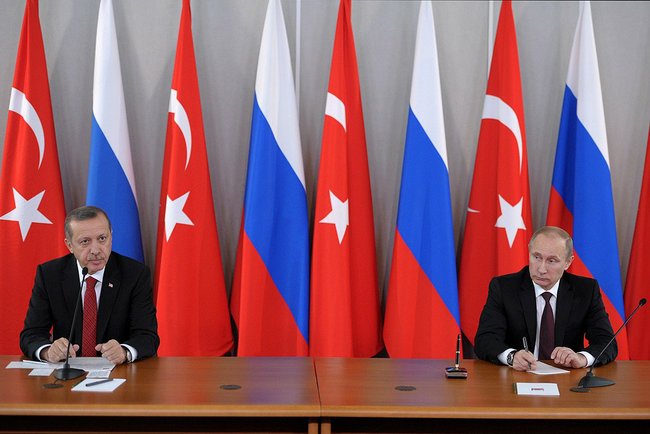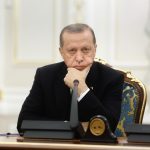by Wayne White
Turkey has disrupted efforts to isolate and weaken the Islamic State (ISIS or IS) since last year. Having the longest border with Syria, Turkey has been a serious obstacle in dealing with the military challenge IS poses as well as the consequences of IS brutality and the Syrian regime’s ruthlessness. Some criticism of what the US-led coalition has done has merit (but not by those eager to throw thousands of US combat troops into this complex maelstrom). Regardless of Ankara’s motivations, the net consequence has been to make taking on IS a far more a difficult slog. This must change.
Until only very recently, Turkish Prime Minister (now President) Recep Tayyip Erdogan refused to allow his NATO allies to use Turkish facilities such as Incirlik Airbase for anti-IS airstrikes. This forced the US, France, and others to fly instead out of distant bases in the Arab Gulf states (or Mediterranean and Gulf-based aircraft carriers). This meant a drain on resources that limited time over IS territory. Fighter-bombers able to reach IS targets in minutes from Turkey were forced to fly an hour or two between targets and their bases and carriers.
Making matters worse, Turkish smugglers, customs officials, and even intelligence operatives thrived off illicit imports of oil and refined fuels from the Islamic State. Ankara did precious little to interdict this lucrative trade. Although only a small portion of Turkey’s overall oil imports, the trade generated significant funding for IS to meet the basic military and economic needs of its self-styled state.
In fact, recent Russian-released satellite photos purportedly showing tanker trucks carrying IS crude moving across the small border area where the Turks face IS are probably accurate. Russian accusations linking Erdogan’s family to profits from this trade also cannot be dismissed out of hand.
More recently, with ramped-up US and Russian airstrikes against IS oil facilities and the conquest by militantly secular Kurdish “People’s Defense Unit” (YPG) forces of a long stretch of territory along the Turkish-Syrian border blocking many smuggling routes, levels of Turkish oil imports from IS probably have fallen off.
Meanwhile, however, Turkey continues to function as a virtual thruway for IS recruits from abroad—much like Syria once did (with the Assad regime’s approval) for foreign jihadists bound for the Iraqi insurgency and al-Qaeda in Iraq during the US occupation there. Turkey has intercepted dribs and drabs of such IS wannabes, but this has been a trifle compared to those getting through. Worse still, Erdogan’s Islamist ruling AKP Party has largely turned a blind eye to extensive IS recruiting in more militantly Islamic areas of Turkey itself, according to an official of Turkey’s Human Rights Association.
Turkey vs. the Kurds
In July 2015, Turkey announced that it was joining the anti-IS coalition, finally allowing US aircraft to operate out of Turkish airfields and beginning a few of its own airstrikes against IS. At the time, this appeared to represent a sea change in Ankara’s attitude toward the Islamic State, but that was not to be. It quickly became clear that the Turks intended to use its purported participation in the anti-IS air campaign instead to primarily bomb anti-Turkish Kurdish groups in Syria and Iraq. Yet these Kurds have proven to be the main secular military bulwark against IS on various battlefields in both countries.
Early indications that Turkey’s focus was on damaging the Kurds came in fall 2014. At that time, IS was engaged in a major drive against the Kurdish city of Kobani to counter the hard-fighting anti-IS YPG. Turkey, long in conflict with this Marxist-oriented Syrian Kurdish movement in northern Syria—as well as its affiliate, the violent Kurdish Workers Party (PKK) extremists within the Iraqi and Syrian Kurdish communities—refused to allow Turkish or other Kurds to come to the aid of Kobani for quite some time. In deference to the wishes of its Turkish NATO ally, Washington also initially shied away from launching airstrikes in support of desperate Kurds battling tenaciously to retain Kobani and surrounding areas.
Turkey vs. Russia
The latest Turkish bombshell was the November 24 shoot-down of a Russian SU-24 fighter-bomber that briefly overflew a narrow stretch of Turkish territory. I am not alone in believing that Erdogan and his AKP cronies most likely approved this reckless move in advance (doubtless anticipating further Russian airspace violations).
Downstream consequences already have been extremely damaging to the struggle against IS, the security of non-extremist Syrian rebel groups near Turkey, and Turkey’s own economy. Since the late October IS bombing of a Russian airliner, Moscow had shifted much of its Syrian air campaign away from Western-backed rebels to IS-related targets, dealing heavy blows to IS’s oil industry. Now, however, an angry Russia has switched its strikes back to non-extremist rebels in northwest Syria near Turkey.
The deployment of advanced Russian S-400 missiles with sufficient range to down aircraft over much of the eastern Mediterranean, Syria, and Turkey threatens the US-led coalition (British strike aircraft fly out of Cyprus). Confusion could result in the shoot-down of coalition aircraft over Syria, with aircrew possibly falling into the hands of IS. Not surprisingly, since the S-400 deployment, the tempo of coalition air strikes has fallen off.
Concerning Turkey itself, Vladimir Putin has vowed: “We will not stop reminding them of what they did…they will not stop regretting their actions.” Turkey is in a particularly vulnerable position, given its $31 billion in bilateral trade with Russia, much of it critical to the Turkish economy. Turkey is dependent on Russia for 60% of its natural gas, hosted 3 million Russian tourists in 2014, and exports $9 billion in produce and textiles to Russia per year. In late November, Putin signed decrees banning Russian companies from employing Turks, suspending the visa-free arrangement with Turkey, stopping charter flights and vacation packages to Turkey, and halting the import of Turkish fruits and vegetables.
Thanks perhaps to French President Francois Hollande who visited Moscow in late November, Putin said at a joint news conference on November 27 that, though still angry over the shoot-down, he remained willing to cooperate with the coalition against IS. Nonetheless, Russian enthusiasm for cooperation against IS following the IS bombing of the Russian airliner has diminished since the Turkish incident. Turkey’s rash behavior has thus resulted in a missed opportunity.
It is high time the coalition leaned far harder on Turkey to be a more useful partner in cornering the Islamic State. A first step in that direction could be for Ankara to accede to American urgings since late November to firmly seal the remaining 60 miles of Turkish border facing IS-held territory in northwest Syria. This step would require many thousands of Turkish troops, but the benefits—significant reductions in oil smuggling and foreign recruits reaching IS—would be enormous.






Not only Turkey also Saudi Arabia! Why we are being chicken shit and not talking about Saudis support for ISIS in this country! Perhaps only Turkey is being blamed because Turkey is poor and unable to contribute funds to our corrupt politicians and the opposite is true in the case of wealthy and corrupt Saudis! Please name one international terrorist act that Saudi hasn’t been mentioned as complicit!
Can the author identify the so-called non-extremists? It seems that most, if not all rebels are Islamist in nature – except when they want to get weapons from the US and its allies.
His analysis of Russian actions after the downing of their aircraft are incorrect. Russia was always attacking IS, in support of the government army. Following the downing of their aircraft they immediately began even heavier bombing of the Al-Nusra affiliated Turkmen.